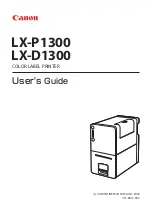
Chapter 7
‐
How to Manage a White Ink Workflow
115
Océ Arizona 6100 Series
How to Create Spot Data in Photoshop
How to Create Spot Data in Photoshop
Introduction
This section explains how to prepare images that include spot data with raster-based image
editing applications such as Adobe Photoshop®. In order to print with white ink or varnish, you
must have an ONYX profile (media model) properly configured for the use of spot data.
To add spot color data to your image in PhotoShop, you need to create a layer within the image
as a new spot channel. It is possible to have more than one spot element in an image, but each
element must be on the same spot channel, and therefore have the same opacity level, or else
ProductionHouse will treat the saved document as a separation file. Since the Arizona printers
with white ink or varnish support two spot channels, you can create one spot channel for Spot 1
data and another for Spot 2 data. CMYK is the preferred image mode as the actions required for
spot data creation are simpler than those for RGB.
NOTE
You can use raster-based image editing applications other than Photoshop as long as it has the
ability to create spot channels.
Purpose
When you have a raster-based image and need to have select areas of that image show up as
white when the media is non-white or clear or translucent, you can prepare a spot channel for the
white data in Photoshop.
When to do
The first step in the white ink or varnish workflow is to prepare your source image to use a spot
ink channel. The spot data must be designed entirely on a separate channel (either as a spot
channel layer or a custom spot color) to be recognized by the Onyx RIP. The name you assign to
this spot channel layer or custom spot color must be Spot 1 or Spot 2 and is the most important
part of preparing the file. This named channel allows RIP-Queue to determine that the data in the
source image needs to be output to the spot channel. In preparing your file, only you can define
what you want to print with "white ink" or "varnish" as part of your design and assign the color as
described in this document. Using your graphic application program, the spot data can be simple
or complex and can range from vector shapes and text to halftone bitmap images.
New Spot Channel Layer
Use the following steps to create a new spot channel layer:
Procedure
1.
Open the desired file in PhotoShop (if the file is in RGB mode, then convert it to CMYK mode).
2.
Use the desired selection tool (e.g. the Magic Wand) to select the area of the image you wish to
print with white ink.
NOTE
The image file used in this example is for illustration purposes only. For best results when
working with text, we recommend that you use a vector-based program such as Adobe
Illustrator.
3.
In PhotoShop, ensure that the Channels tab is visible (under the Window menu click Channels to
view the panel).
4.
Click the arrow on the Channels tab to display the Channels menu.
Summary of Contents for Arizona 6160 XTS
Page 6: ...Contents 6 Oc Arizona 6100 Series...
Page 7: ...Chapter 1 Introduction...
Page 15: ...Chapter 2 Safety Information...
Page 44: ...44 Chapter 2 Safety Information Oc Arizona 6100 Series Safety Awareness...
Page 45: ...Chapter 3 How to Navigate the User Interface...
Page 67: ...Chapter 4 How to Operate Your Oc Arizona Printer...
Page 79: ...Chapter 5 How to Operate the Vacuum System...
Page 85: ...Chapter 6 How to Print in Batch and Dual Origin Modes...
Page 91: ...Chapter 7 How to Manage a White Ink Workflow...
Page 125: ...Chapter 8 Ink System Management...
Page 135: ...Chapter 9 Error Handling and Troubleshooting...
Page 139: ...Chapter 10 Printer Maintenance...
Page 174: ...174 Chapter 10 Printer Maintenance Oc Arizona 6100 Series How to Bleed an Ink Filter...
Page 175: ...Appendix A Application Information...
















































